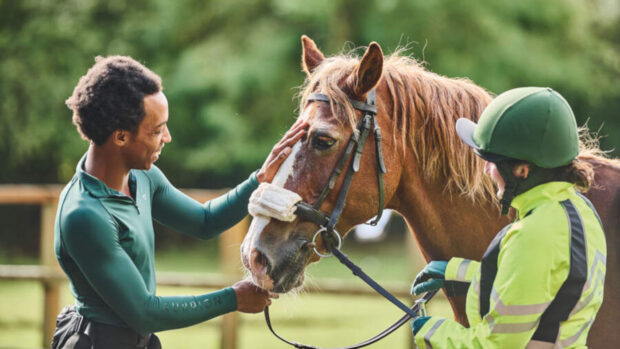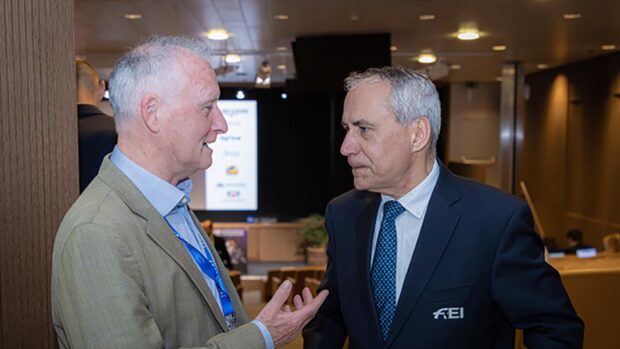Interacting with horses is a “lifeline” to young people, research has found – not only highlighting the strength of the horse-human bond but helping secure our sport’s future.
The British Horse Society (BHS) has published the results of a study it carried out with the University of Buckingham to analyse the effectiveness of equestrian-led educational schemes such as the BHS’s Changing Lives through Horses (CLtH).
Considering available research and CLtH, including interviewing programme participants, it looked at six key skill areas: communication, confidence, teamwork, responsibility, perseverance and relationship-building.
“It found that there has been a statistically significant improvement across the six areas and that equine interactions have proven to strengthen participants’ transferable skills, enhance social and emotional development, and create a positive shift in their behaviour,” a BHS spokesperson said.
“Research also discovered that horse-led activities have helped people with autism improve social functioning, goal attainment and empathy, and help decrease behaviours such as irritability and hyperactivity.”
The CLtH programme aims to improve the lives of young people who need additional support, are disengaged or disadvantaged, or at risk of becoming excluded from education. The programme, run at BHS-approved centres, is an alternative to education and has helped thousands of people.
BHS chief operating officer Sarah Phillips told H&H a “great strength” of CLtH is that it allows the charity to work with people from all backgrounds and of all abilities.
“This scheme is more than just learning to ride; it’s about helping young people find a place in the world, through the magic of horses,” she said. “We all know how special that bond is; the connection is truly unlike anything else and the findings of this study are true testament to that.
“It’s so important to us that as many people as possible have the opportunity to experience this bond and access high-quality, equine-led alternative education to support their individual needs. We want to be able to empower every individual, so they can thrive.”
Ms Phillips said reinforcing horses’ ability to connect with people will help “share a positive narrative”.
H&H reported that new Riding for the Disabled Association CEO Michael Bishop believes that the more people to whom horses are relevant, the more likely riding horses will retain public support, and Ms Phillips agrees.
“When it comes to social licence, it is about being relevant,” she said.
“A great proportion of participants on our CLtH programme had never seen a horse in person. Many thought it wouldn’t have been possible. But after just one day, you can see they have fallen in love with the horses. We’ve spoken to parents whose children have been so excited to return. It’s clear these experiences have truly changed their lives.
“These families, who may have never even given a second thought to horses, now play very important roles as key advocates for the powerful horse-human bond. There are so many brilliant, positive initiatives and interactions at our riding centres, and we want to put these experiences at the forefront of the conversation.
“Many of those who take part in the CLtH initiative are enthusiastic to share these stories. These, with the study, will be very important as we evidence just how essential that unique horse-human relationship is for future generations.”
Becky, a non-horsey mother of twin daughters with attention deficit hyperactivity disorder and autism, is keen to help promote CLtH “so more children can benefit”.
She told H&H her daughters, now 13, were referred soon after they joined their mainstream secondary school, by the school itself, as the transition had been very tough for them.
“They started with one day a week at the stables, then it was increased to two, and I’ve had some lovely reports from the owner,” she said.
Becky said her daughters have grown in confidence, and that both now want to work with horses.
“They’ve really benefited from it,” she said. “They struggled with friendships at school, and that happened for a few months at the stables but then it stopped, as they were able to express themselves and be calm around the horses. It’s hard to put into words the difference it’s made.”
Becky cited the space, the lack of pressure, the absence of a classroom environment, the supportive staff – and the horses.
“They’re so in tune with emotions and they just seem to know what the person needs,” she said. “The girls talk about the horses as friends.”
Becky hopes her daughters will secure the nationally recognised qualifications available via the scheme, which will benefit their employment prospects.
“Before, they didn’t have a clue what they wanted to do when they’re older; now they do,” she said. “We adopted them aged three; they had a rough start so to have something like this to focus on, it’s more than I could have thought possible for them.”
- To stay up to date with all the breaking news throughout Blenheim Horse Trials, Horse of the Year Show, London International and more, subscribe to the Horse & Hound website
You may also be interested in:

Why horses’ relevance to the public is key to our sport’s survival

‘We have to stand up for the horses’: welfare stewards coming to a show near you

Subscribe to Horse & Hound magazine today – and enjoy unlimited website access all year round





